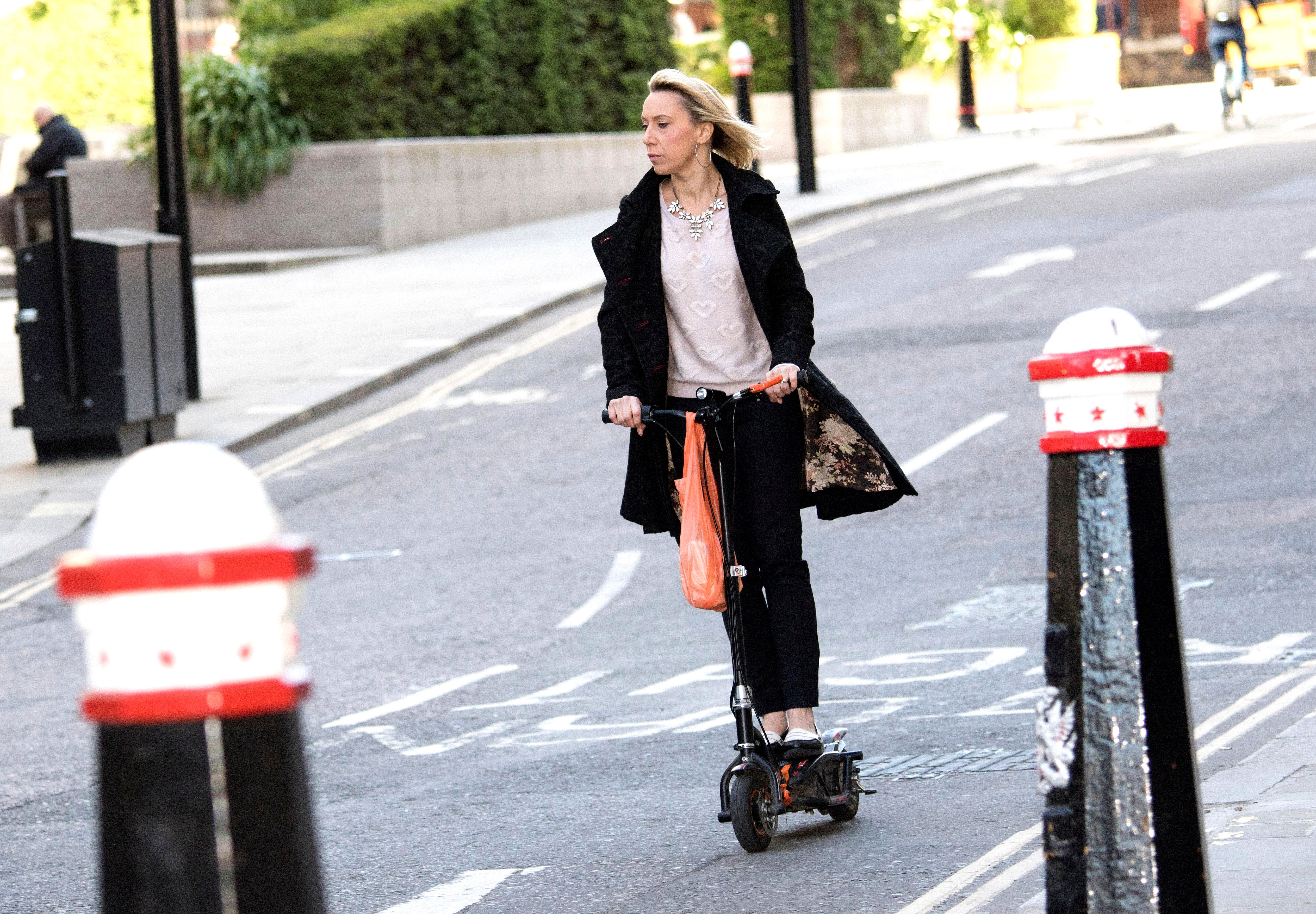Are electric scooters about to take over your city?
They're kind of dorky. They also might be the future of commuting.

Scooters are often viewed as the transportation of childhood, ridden in circles around cul de sacs on sticky summer afternoons. But these days, plenty of adults are starting to take them out for a spin, too.
Scooter sharing is beginning to gain momentum in major metropolitan areas as an alternative and innovative commuting option. Last month, Conde Nast Traveler declared scooter shares the "unlikely trend that'll reshape the way we travel." "I have seen the future of urbanism and it's a scooter," a soothsaying CityLab headline announced in March.
The concept is similar in structure to the bike shares that have planted bicycles around cities that anyone can ride for a fee — except, of course, these are scooters. But these aren't the scooters that kids are riding around. The scooters of scooter shares are electric, though CityLab notes that they do "look like a souped-up electric version of the folding Razor kick-scooters." The scooters, which weigh between 30 and 40 pounds, have treaded rubber tires and can zip along at up to 15 miles per hour.
The Week
Escape your echo chamber. Get the facts behind the news, plus analysis from multiple perspectives.

Sign up for The Week's Free Newsletters
From our morning news briefing to a weekly Good News Newsletter, get the best of The Week delivered directly to your inbox.
From our morning news briefing to a weekly Good News Newsletter, get the best of The Week delivered directly to your inbox.
The two main players in the scooter-sharing business are the startups LimeBike and Bird. Both were founded last year. A third scooter-share company, Waybots, recently launched in Washington, D.C., with plans to expand. LimeBike currently has scooters in San Diego, Los Angeles, and Washington, D.C., while Bird, the brainchild of former Uber and Lyft executive Travis VanderZanden, has landed in cities including Austin, Los Angeles, San Diego, San Jose, and Washington. Bird plans to have its scooters parked in 50 U.S. markets by the end of this year.
In all of these schemes, scooters are scattered around cities, and users can locate and unlock them using a smartphone app. Rides on Bird's scooters cost a minimum of $1 and riders are charged 15 cents for each additional minute of their ride, CNN reports. Bird collects its scooters each night to recharge them, putting out freshly charged scooters around the city each morning for riders' commutes.
So why scooters? After all, Americans already have cars, motorcycles, trains, and bikes. Do city dwellers really need another way to get around?
Well, yes. After all, cars and motorcycles both contribute to carbon emissions and further crowd already congested streets. And with increasingly unpredictable subway commutes in places like New York City, it's easy to see why it might seem more reliable to hop on an electric scooter than sit underground for an untold minutes or even hours.
A free daily email with the biggest news stories of the day – and the best features from TheWeek.com
But why scooters instead of bikes? Because the scooters are electric-powered, they're easier to ride up hills. Moreover, with the boost of electricity, you're less likely to show up to work drenched in sweat and, because you're standing up instead of hunched over the handlebars, there's a lesser chance your business casual attire will be crumpled.
Scooter sharing isn't without problems, of course. San Francisco is currently looking into regulating electric scooters after receiving numerous complaints, the San Francisco Chronicle reports:
Detractors complain that riders are leaving the scooters — sometimes piling them — in the middle of sidewalks and bike lanes, and blocking building entrances with them. Pedestrians say they've tripped over them, and people with disabilities say they're unwelcome and difficult obstacles to navigate around.Some users exacerbate the problem by illegally riding the scooters on sidewalks, buzzing pedestrians as they weave in and out of crowds. [San Francisco Chronicle]
It's not just an issue of annoyance either. A rider told The San Diego Union-Tribune that it can feel "unsafe" to ride in traffic, while pedestrians argue that it feels dangerous to have scooters racing down the sidewalks. "We were afraid we were going to be hit," Dave Gapp, who said he and his wife "almost crashed into three people zipping down the sidewalk on scooters," told the newspaper. "If a 200-pound person going even 10 miles per hour runs into someone that's going to cause considerable damage."
Scooter users have already gotten injured. In January in Santa Monica, a rider who was not wearing a helmet was "seriously injured" after riding through a stop and then crashing into a car, the Los Angeles Times reports. Another rider told the Times that he's seen "a lot of people going 15 miles per hour, and then hit something because they didn't realize how close they were."
Riders are supposed to be over the age of 18, have a driver's license, agree to wear a helmet, and stay off sidewalks. However, the Santa Monica Police Department says it's been issuing citations because plenty of riders are breaking these rules.
Though far less serious, there's also the issue of image. Historically, adults riding scooters have not been viewed as the hallmark of hip. A quick Google search of "adults riding scooters" pulls up articles like "Can adults ride a scooter with dignity?," "Adults riding scooters is the worst trend since the selfie stick," and "It's too bad electric scooters are so lame because they may be the future."
The question is: Will electric scooters be the future, or is this a fad that's soon to fade? Clearly there are still kinks to be worked out. But with seemingly endless subway delays, getting back on a scooter might start to look more and more tempting.
-
 Political cartoons for December 6
Political cartoons for December 6Cartoons Saturday’s political cartoons include a pardon for Hernandez, word of the year, and more
-
 Pakistan: Trump’s ‘favourite field marshal’ takes charge
Pakistan: Trump’s ‘favourite field marshal’ takes chargeIn the Spotlight Asim Munir’s control over all three branches of Pakistan’s military gives him ‘sweeping powers’ – and almost unlimited freedom to use them
-
 Codeword: December 6, 2025
Codeword: December 6, 2025The daily codeword puzzle from The Week